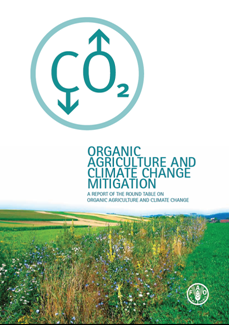
The Organic Research Centre hosted the 5th meeting of the Round Table on Organic Agriculture and Climate Change, at which the potential for organic systems to mitigate against and adapt to the effects of climate change was discussed. In addition a recent report containing a summary of work carried out by the RTOACC and the potential for organic systems to contribute to soil carbon sequestration was discussed in some depth. The presentations and discussions demonstrated that organic systems can provide adaptive capacity for farms by improving soil quality, diversity of farm enterprises and income streams. This potential of organic agriculture in the developing world is of particular interest, in light of the severe effects of climate change that are already being witnessed there. Minutes from the meeting and copies of the presentations made will soon be made available at www.organicandclimate.org.
RTOACC is a multi-stakeholder initiative that has been working since its inception in 2009 to accumulate evidence on three important areas of potential climate change impacts of organic farming: soil carbon sequestration within organic systems, the potential for organic farming to contribute to carbon trading/offsets and Life Cycle Assessment (LCA) of conventional and organic products.
The report “Organic Agriculture and Climate Change Mitigation” (PDF 1.1MB), published by FAO, represents the output of three Round Table workshops held to address these issues. Co-ordinated by the International Centre for Research in Organic Food Systems (ICROFS) in Denmark and the Institute of Organic Agriculture Research (FiBL) in Switzerland, the report includes contributions from Danish researchers on life cycle assessment of organic and non-organic products and Swiss results from a meta-study on organic agriculture and soil carbon sequestration.
ORC is an active participant in RTOACC. For more information contact Laurence Smith or visit our Climate Change webpage.
